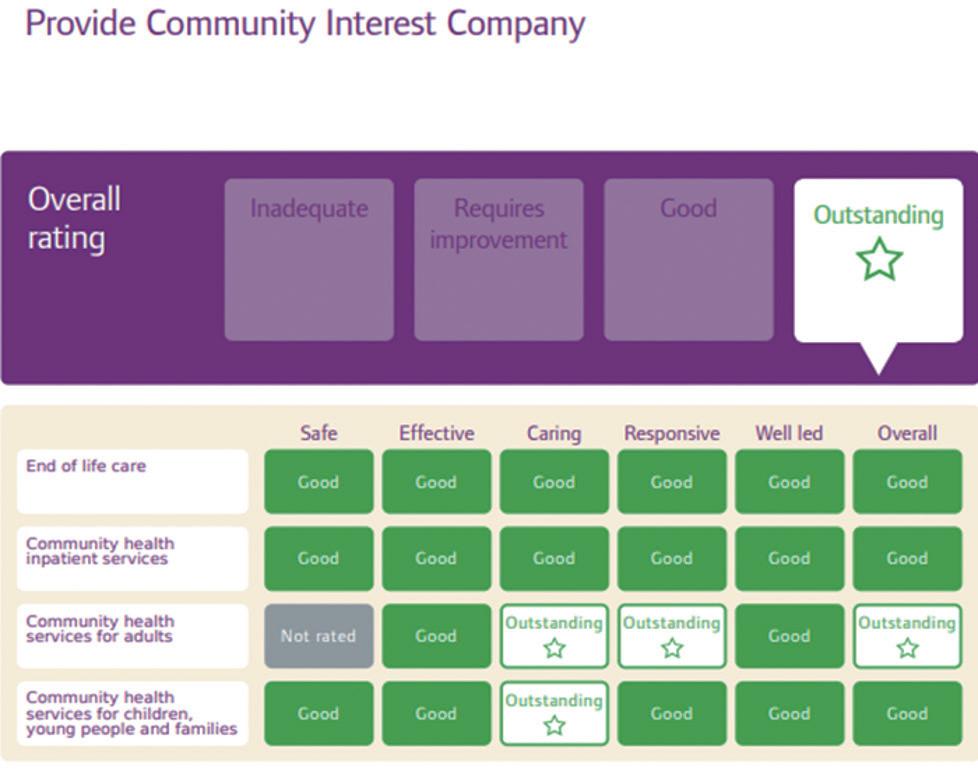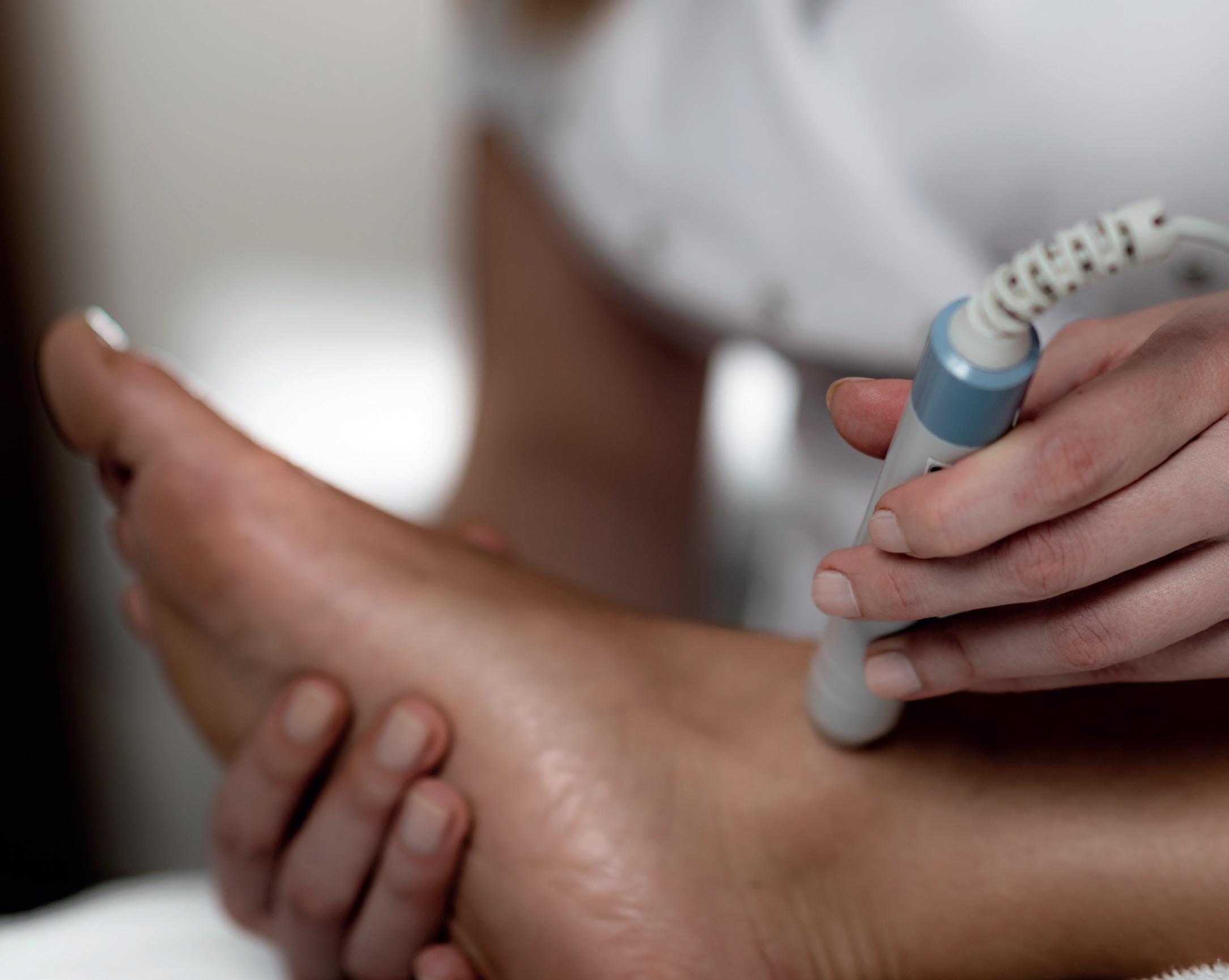
7 minute read
Demonstrating Quality
Our approach to quality
Our focus is to ensure our services are safe, effective, caring, responsive and well-led. To achieve this the Board has ensured that there are well-defined governance systems and processes in place to enable the delivery of safe, effective, caring, responsive and well-led services where our customers and staff are at the heart of everything we do.
Our Board check and assure quality standards by monitoring, reviewing and evaluating a wide range of quality data and information such as: Bi-monthly quality and safety reports Well-defined processes for risk assessment shared bi-monthly Specialist reports from all support services in relation to medicines management, safeguarding, infection prevention, information governance, learning and development, health and safety, service delivery issues, and patient experience. The Board are aware of all serious incidents which occur during the year. They see reports and action plans from incidents and complaints and are able to be assured that appropriate measures are in place to deal with issues when things go wrong. The Board encourage openness and transparency in all we do and have backed the implementation of our statutory Duty of Candour. The Board regularly visit different areas across the organisation to see first-hand the quality of the services being delivered and to speak with staff and our customers face-to-face. The breadth of assurance provided to the Board allows structured discussions at Board meetings and provides detailed insight into the quality of the care being delivered as the norm across services, while recognising the need to improve where things go wrong in an open and transparent manner. Stephanie Dawe, Executive
Provide quality assurance process

Clinical & Operations Director This robust governance framework provides assurance for the Chief Executive, the Chairman and the Board of Directors, the Care Quality Commission (CQC) Registered Manager, and the senior managers and clinicians that the essential standards of quality as set out by the Care Quality Commission (CQC) are being met in every part of the organisation.
Between January and March 2019 we underwent a comprehensive inspection by the CQC and the outcome of this was that our organisation was rated as outstanding overall and we achieved good or outstanding ratings against all domains on quality and safety inspected by the CQC.
Our Current CQC Rating

To view our current CQC reports visit the Care Quality Commission website: www.cqc.org.uk/provider/1-168055209
The CQC report highlighted that during inspection they rated us outstanding because:
Community health inpatient services understood how to protect patients from abuse, worked well with other agencies and local NHS trusts. Had a clear admission criteria. Delivered people’s care and treatment based on current evidence-based guidance, standards and best practice and cared for patients with compassion. Community health adult services used infection control measures to prevent the spread of infection. Staff showed themselves to be caring and responsive and understood how and when to assess patient’s capacity to make decisions about their care. Staff often exceeded patients’ expectations by going the extra mile to provide excellent care and displayed a proactive approach to understanding needs and preferences of different groups of people.
We listen to staff and customers - We take action to learn from incidents, complaints, and freedom to speak up concerns and ensure systems and services are improved and made safer as a result. Incident reporting - Staff report incidents and near misses if they see one. The majority of incidents reported result in no harm or low harm. Policies and guidance - We have robust policies in place to ensure we deliver the right care in the correct way based on best practice guidance and to ensure we support our staff in the right way. This includes robust clinical infection prevention, safeguarding and health and safety policies and procedures, training, audit and specialist advice is in place to enable staff to achieve high standards. Risk management - We have a robust risk management process in place to identify, manage and maintain oversight of risks. Safe equipment - We have appropriate equipment in place to keep staff, visitors and service users safe and all equipment is regularly maintained and repaired. Safe premises - We have clean and well-maintained clinical environments and we ensure they are compliant with good health and safety and infection prevention practices. Consent - We have robust safeguarding policies and procedures and training in place and our staff know how to obtain and document valid consent before undertaking any care or procedures. Competent staff - Our staff are appropriately trained and experienced. We maintain high compliance with mandatory training and ensure robust safer recruitment processes are in place. Regular checks are made to ensure staff maintain their professional registration with the professional bodies. Visible leadership - Senior management and the Board visit service areas to observe care delivery first-hand which enables them to speak directly to staff and service users. Staffing levels - meet the needs of service users and patients. We report staffing levels to the Board where the data is looked at in relation to incidents to ensure we are able to care safely across all areas. Safety alerts and NICE guidance - We ensure all relevant NICE guidance and safety alerts are distributed to teams who take action to implement the recommendations in the guidance and alerts. Business continuity and major incident preparation - We have robust plans in place in the case of a major incident or severe weather that can disrupt service delivery to make sure that service users still receive the care they require. Never events - We have had no never events reported in any of our services. Never events are incidents which should never happen as they are preventable with the correct policy and procedures in place. Partnership working - We work closely with colleagues across health and social care to improve the quality of services we deliver by actively reviewing incidents and issues that arise when people move between our services. We also have key staff working in the acute hospital to provide support for the safe and effective discharge and transfer of people back into the community after attending or being admitted to hospital.
Our 2019-20 priorities - what we achieved
In 2018-19 we reached year three of our threeyear clinical strategy. Building on our success and core values we reviewed this clinical strategy and further extended it by a year to 2020. This has helped us to continue to look forward and develop our clinical services, not only to keep us relevant and fit for purpose but to ensure that the quality of the services we deliver is continually improving. Our clinical strategy priorities were aligned to our organisational vision and values.
Our goal was: To ensure we responded to the physical and mental needs of our patients through working in partnership across the wider health and social care economy. What we did: Redesigned children’s services as part of a partnership arrangement with the opening of Stapleford House in Chelmsford. Responded to the requests of our patients for remote/technology-based care delivery and interactions by exploring the development of technology and artificial intelligence care delivery. Participated in a primary care partnership model for care delivery at Crouch Vale Surgery. Our key priorities were:
Care and Compassion – To ensure we have a committed workforce which delivers patient-centred care through relationships based on empathy, respect and dignity.
Nurture and Empower - To nurture a structure that promotes empowerment, fosters a belief in people’s ability to be empowered, and acknowledges there is power in the relationships and care provided.
Innovation and Competence – To ensure we have an organisational culture that drives innovation, which balances cost and healthcare quality and ensures staff are equipped with the skills, knowledge, attitudes, values and abilities for effective, competent practice.
Below is a summary of what we achieved in our
Care and compassion
Clinical Strategy.
Nurture and empower
Our goal was: To improve our workforce capacity and performance by ensuring our staffing levels did not compromise patient safety and that staff had the required skills to deliver care.
What we did: Implemented a programme of recruitment events across the region to promote the work of Provide as a prospective employer for people. Targeted areas to encourage career pathways in care such as high schools and universities. Applied fair pay scales across all temporary staffing bands to promote recruitment and encourage retention. Invested in our staff through a process of talent management and skills mapping.

Innovation and Competence Our goal was: To continue to build on the range and format of quality data available to the Board to measure performance and monitor quality.
What we did: Participated in the NHS Benchmarking Learning Disability audit. Continued participation in the following national audits:
// National Safety Thermometer. // SSNAP – Sentinel Stroke National
Audit Programme. // PASCOM Audit Podiatric Surgery. // National Diabetic Foot Care Audit.
Implemented a mortality review process, including LEDER reporting within the organisation. Included benchmarking measures in the Board quality assurance reports. including: //
Pressure ulcer data
Falls per 1,000 bed days
Friends and Family Test ratings. Improved our approach to dissemination and embedding of learning from serious incident investigation with the appointment of a designated investigator. Continued to build on the benefits of quality data obtained from the annual clinical audit programme by reviewing outcomes and actions and ensuring strategic oversight of these.







